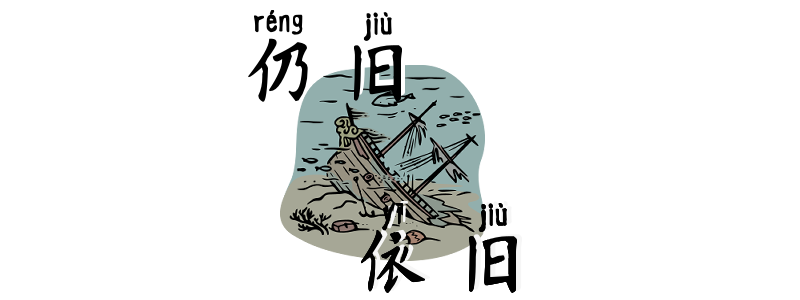Grammar Point:The Chinese words 依照 yīzhào and 依據据 yījù both mean “according to” or “based on,” and they are often used to indicate that an action, decision, or judgment is being made following a standard, rule, evidence, or guideline. 依照 yīzhào It often used in situations involving practical actions or processes, where instructions or methods are explicitly stated. 依照yīzhào說明書shuōmíngshū安裝ānzhuāng依照yīzhào说明书shuōmíngshū安装ānzhuāngInstall…
Category: HSK 5
“Secretly” in Chinese – 偷偷 tōutōu
Grammar Point:偷偷 tōutōu is an adverb in Chinese that means “secretly,” “stealthily,” or “quietly without being noticed.” It describes an action that is done with the intention of avoiding detection or attention. Structure S + 偷偷 tōutōu + (地 de) + V In modern usage, 地 de (a particle that connects adverbs to verbs) can be omitted with 偷偷 tōutōu, especially…
“Finally” in Chinese 2 – 總算 总算 zǒngsuàn
Grammar Point:總总算 zǒngsuàn is an adverb in Chinese that means “finally,” “at long last,” or “after all the effort or waiting.” It is used to express a sense of relief, satisfaction, or achievement after overcoming challenges or enduring a long process. Structure S + 總总算 zǒngsuàn + V or Adj 總总算 zǒngsuàn often conveys the speaker’s emotional relief or satisfaction…
“Obviously” in Chinese – 明明 míngmíng
Grammar Point:明明 míngmíng in Chinese is an adverb used to emphasize that something is clear, obvious, or certain, often carrying a tone of dissatisfaction, frustration, or pointing out a contradiction. It roughly translates to “obviously,” “clearly,” or “plainly” in English. When Do We Use It Structure 明明 míngmíng + Fact Situation + (but) + Unexpected Result 他tā明明míngmíng答應dāyìng了le,…
“After all” in Chinese – 毕竟 bìjìng
Grammar Point:The Chinese word 畢毕竟 bìjìng is commonly used to emphasize a fact or reason, often suggesting that something is understandable or inevitable because of certain circumstances. It can be translated into English as “after all,” “in the end,” or “as expected.” It is used both in spoken and written Chinese. Structure 畢毕竟 bìjìng + Fact + ConclusionConclusion…
Expressing Future in Chinese 2 – 将 jiāng
Grammar Point:In Chinese, 將将 jiāng is used to indicate something that will happen in the future. It’s more formal and commonly appears in writing, official speeches, or announcements. It can also be combined with 會会 huì or 要 yào to express someone’s willingness. Structure S + 將将 jiāng / 將将要 jiāngyào / 將将會会 jiānghuì + V Generally, when 將将 jiāng is combined with 會会…
5 Ways to Say “Still” in Chinese
Introduction:還还 hái, 仍然 réngrán, 依然 yīrán, 仍舊旧 réngjiù and 依舊旧 yījiù share a similar meaning of “still,” but there are some differences in their usages and connotations. 還还 hái (HSK 2) Still, also, or yet. It implies that something continues, but in a more casual or neutral way. Commonly used in spoken language and can…
“Still” in Chinese 4 – réngjiù and yījiù
Grammar Point:In Chinese, both 仍舊旧 réngjiù and 依舊旧 yījiù mean “still” or “as before,” but they are used slightly differently in terms of nuance, formality, and context. Structure S + 仍舊旧 réngjiù + Adj or V Common in both spoken and written language, though it leans slightly more formal. It often emphasizes the continuation of something despite expectations or…
“Always” in Chinese 2 – 一向 yíxiàng
Grammar Point:一向 yíxiàng is a Chinese adverb that means “always” or “consistently.” It’s used to describe habits, actions, or characteristics that have remained the same over a long period, up to the present. It’s similar to saying “it’s always been this way” in English. Structure S + 一向 yíxiàng + Adj 這zhè家jiā店diàn的de價格jiàgé一向yíxiàng很hěn高gāo这zhè家jiā店diàn的de价格jiàgé一向yíxiàng很hěn高gāoThe prices at this shop…
“Again” in Chinese 2 – 再次 zàicì
Grammar Point:The word 再次 zàicì in Chinese means “again” or “once again”. It is used when you want to express repeating an action or event, similar to the English word “again,” but it carries a slightly more formal or deliberate tone than other ways of saying “again” in Chinese. Structure 再次 zàicì + verb 再次 zàicì is more formal than…









